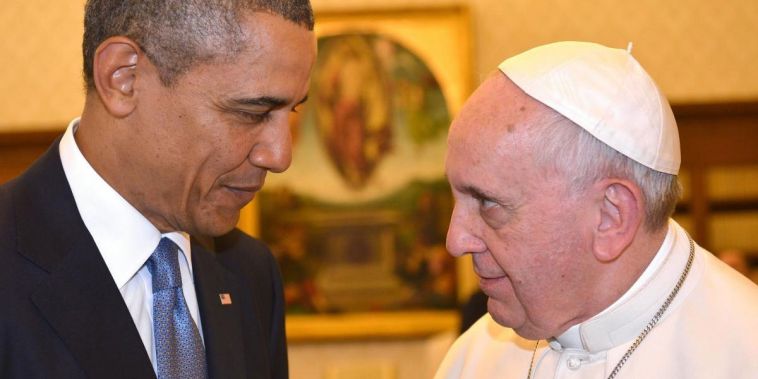“Who would Jesus bomb?” The popular bumper sticker slogan takes on new relevance after Pope Francis seemed to cautiously endorse airstrikes against the terrorist group known as the Islamic State in Iraq and Syria.
Videos By Rare
Like much of what this pope says, the comments were greeted by media confusion. Vox, liberal “explanatory journalism” website, bizarrely invoked the Crusades with this headline: “News from 1096 AD: Pope discusses military force against Middle Eastern caliphate.” The piece was later updated with a substantial correction.
That’s because what the pope said was much more nuanced and complicated. He acknowledged the obvious: the barbaric beheading brigade of ISIS is engaged in unjust aggression which may be countered by force. But even that isn’t a blank check for total war.
“In these cases, where there is an unjust aggression, I can only say that it is licit to stop the unjust aggressor,” Francis said. “I underscore the verb ‘stop.’ I’m not saying ‘bomb’ or ‘make war,’ just ‘stop.’ And the means that can be used to stop them must be evaluated.”
“One nation alone cannot judge how you stop this, how you stop an unjust aggressor,” the pope added, suggesting that no one nation can arrogate for itself the role of policeman of the world. No one country is a world government in embryo. International cooperation prevents imperial overreach in response to aggressors like ISIS.
Here, the pope is discussing a Christian doctrine for the morally appropriate use of force known as just war theory. It was developed and most closely associated with the Catholic Church, but holds sway over many other Christians (I’m a Methodist).
According to just war theory, wars may be undertaken only for just causes like the protection of innocent human life. War must be undertaken as a last resort. It must be waged by a legitimate public authority. There must be a reasonable probability of success. And war cannot unleash greater evils than inaction.
This isn’t pacifism or even “isolationism,” properly understood. But taken together—a war must satisfy some version of all of the above criteria to qualify as just—it is a much higher threshold for the use of force than political leaders in both parties in Washington have employed in recent years.
George W. Bush was correct that Saddam Hussein was a bad man and tyrannical ruler. Barack Obama was right to make the same judgment about Muammar Gaddafi. The fact that both men in a very real sense deserved to be overthrown was used to justify the wars in Iraq and Libya.
But just war theory requires more than that. Did Bush and Obama have the legitimate public authority to make these judgments about foreign states unilaterally? What probability of success was there for the mission of creating a stable, functioning democracy in Iraq?
Was due consideration given to the possibility that the evils unleashed by regime change in Iraq and Libya might be worse even than the considerable evils already in effect in those countries? That’s no longer an academic question. ISIS has taken over vast swathes of Iraq. Libya is viewed as Woodstock for jihadists.
Since the Iraq war, the plight of Iraqi Christians has worsened. In June, mass was not said in Mosul for the first time in 1,600 years. Christian leaders have described a “mass cleansing” of their coreligionists from Mosul by a “bed of thieves.”
The pope has emphasized that Iraqi Christians aren’t the only people who are at risk, however. “There are men and women, religious minorities, not just Christians, and they’re all equal before God,” he has been quoted as saying.
That is why he is telling the world it is just and necessary to resist ISIS, but imperative to avoid making things even worse.
Whether a proposed military action satisfies all the requirements of just war is sometimes subject to debate and prudential judgment. The United Nations, the body best situated to represent the international community in the way that just war theory envisions, unfortunately leaves much to be desired.
During the Cold War, some Christian progressives underestimated the comparative justice of the Western side versus Soviet communism. Though even then, there were some ill-advised and unjust interventions.
Nevertheless, just war theory is a morally sound approach with a long pedigree for Christians seeking an alternative to recent, disastrous preventive wars.
Military action against ISIS can comport with just war theory under the right circumstances. But it’s hard to see how the Iraq war that helped unleash ISIS could have.

